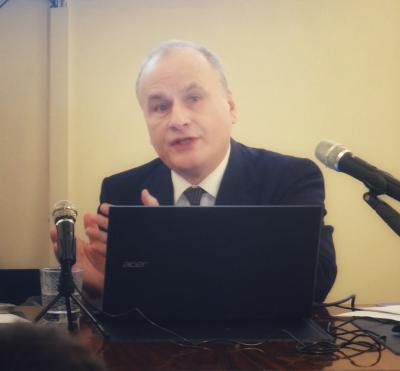Western world too 'vacuous' to connect to the East

ROME - Dr. Benedikt Koehler, the author of Early Islam and the Birth of Capitalism, asserts that relations between Europe and the Islamic world 'have not progressed in the past 100 years. In a talk on the pre-fascist era historian Leone Caetani’s insights into the then-relationship between Libya and Italy at the Euro-Gulf Information Centre, Dr. Koehler stressed that “Caetani wrote this 100 years ago, you could change the date and people would believe that it was written yesterday.” Tragic but true, Westernisation as a means of optimising the local population for the generation of wealth is doomed to fail.
“The is a long prehistory of the relationship between Italy and Libya, a history that goes right back to the European consciousness being born in the opposition to the east in the Illiad,” said Koehler.
The talk was focused around the theme of culture: defining oneself against the other, the centrality of Islam to the Libyan identity, and the “acid washing” effect of western rationalism when imposed on the Libyans through colonialism.
The temptation is to impose a western mindset upon people and for good reason. If an occupying force, in 1910 or in 2010, can convince the local population that their view of the world is the correct one, they are can lead rather than antagonise, win minds through hearts.
Caetani’s knowledge of the region was, and remains, nearly unparalleled, a wealth of information that allowed him to form a picture of Libya society from its bedrock up.
The rationalism, secularism, and materialism of the west, in his opinion, was inevitably going to lead to the east rejecting these values and returning to the Islamic core of their society with renewed fervour.
Rationalism is not a philosophy that can exist well with other cultures. A person cannot embrace secular humanism and a society centred around religion. Not only does rationalism oppose religion, in Caetani’s opinion, but undermines it. The locals that embrace the west suffer a kind of cultural death, through “Europeanising them.”
Koehler did an excellent job of summarising Caetani’s theory that “heretical” religious movements in the East are also social and political in nature, a point excellently demonstrated by Koehler’s own research into early Islam: “The prophet built a mosque and a market,” political and social structures are intimately linked to religion.
Of course, Caetani’s insights did not prevent the colonisation of Libya, the brutal war that followed, or the passing around of the region between post-war powers until revolutions led to the end of Gaddafi’s rule.
The importance of Caetani’s insights are clear, relations between the nations have led to untold suffering in the east and “resentment towards the west.” Respect for societies that are not based around our western tradition, as much as westerners reject governance that is not based on our own long and bloody struggle the led the church being cut out of the heart of society in order to save the body.
Speaking to Koehler after the talk, the Italian Insider asked how the west and east can interact in a way that is not inherently oppositional. Koehler pointed to the vacuous nature of the western world, individualism is prioritised above community or religious values, two forces that shape people’s lives and aligns them with the people they live with. “We could do a better job presenting our own values, materialism is clearly not enough.”
jp-kvh


